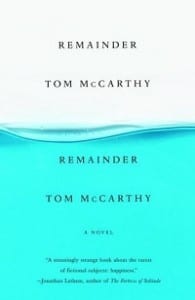UCL Festival of Culture: Tom McCarthy: Space, Data and the Death Drive
By Melissa Bradshaw, on 16 June 2016
UCL’s Festival of Culture concluded with a rare opportunity to hear from twice Booker nominated author Tom McCarthy in a Q&A with Dr Julia Jordan (UCL English) in a stunning and intimate setting.
Titled ‘Space, Data and the Death Drive’, the session took place at the House of St Barnabas in Soho, a not-for-profit private members club that offers help for the homeless. It was part of One Day in the City.
Those fast enough to book a seat gained a special insight into the theoretic matrix that lies behind McCarthy’s novels Remainder (2005), Men in Space (2007), C (2010) and Satin Island (2015).
Space, data and the death drive were all covered separately but it emerged that the three themes were interwoven.
Beginning with a reading from C McCarthy discussed his engagement with the idea of bodies in space, in part informed by an experience that he doesn’t often talk about: being a life model in Prague aged 22, where the students would grid the paper in order to replicate their subject.
“All my novels are about failed transcendence,” he said, “when the grid is working its pure violence.” In C, the central character Serge Carrefax, who becomes an observer for the Royal Flying Corps, “always crashes back to earth too early”, said McCarthy.
Remainder is about a hero who repeats or tries to repeat a primal trauma he cannot name. His most recent novel, Satin Island, starts in an airport, which is literally controlled space. “I’m drawn to the moment of disruption”, he said.
Of data, McCarthy said “all my characters are nodes within networks, subject to language in history and traumas that they don’t really understand”, referencing “the high modernists, Freud, Lacan and feminists”.
A more contemporary reference was Edward Snowden, who McCarthy said “makes a political question a literary one: what gets written down and who gets to read it?”

Image: Vintage Books
He also presented a view of data flow as the 21st century version of the sacred: “data and the internet is your interface with the absolute”.
Finishing with the death drive, Dr Jordan brought up McCarthy’s statement that all narrative is about the death drive. Normally, we think of narrative as about pleasure, she pointed out, and so this concept of narrative is a part of McCarthy’s critique of humanism.
He pointed to Freud’s Beyond the Pleasure Principle, when Freud’s observance of a child repeating a destructive game (which Freud interpreted as centred on the absence of the child’s mother), him to conclude that there is a drive towards death in the human psyche.
Freud was a storyteller, said McCarthy, and the death drive is what repetition is about: this is the repetitive compulsion his characters are under.
McCarthy discussed his literary influences, including Stephané Mallarmé, Franz Kafka, James Joyce, T.S. Eliot, Ezra Pound and Samuel Beckett. “It astounds me,” he said, “that so much literature still clings to this silly humanist model.”
But while McCarthy’s work engages in a kind of repetition with the work of these men, feeding back to the overall themes of One Day in the City, the session was also an insight into the metaphysical shifts literature faces in the digital age.
 Close
Close

